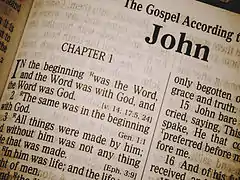In the beginning (phrase)
"In the beginning" (translated in the original Biblical Hebrew: Bereshit) is an opening phrase first used in the Bible in Genesis 1:1. First referring to the beginning when the heavens and Earth were created and later commonly paralleled to Christians once again in John 1:1 as the "Word" being with God and being God during the beginning. Outside of the Bible, it is a common term in popular culture such as album titles and fiction titles.
%252C_2011_South_Federal_Hwy%252C_Boynton_Beach%252C_Florida.jpg.webp)

Etymology and origin
The original word in the Bible in Ancient Hebrew writings is Bereshit (בְּרֵאשִׁית): "In [the] beginning [of something]". The definite article (i.e., the Hebrew equivalent of "the") is missing, but implied.[1]
archē (Ancient Greek: ἀρχή) is the original phrase that is used in John 1:1.
Usage
In Genesis 1:1, the full verse saying is translated as fully saying:
“In the beginning God created the heaven and the earth.” (King James Version)
[1] "In the beginning" was used once again referenced in the New Testament in the verse John 1:1:
"In the beginning was the Word, and the Word was with God, and the Word was God."
Tradition and theology
In Judaism
The first word, and thus God's role as Creator, is recited in the Aleinu prayer near the end of each of the three daily prayer services.
In Christianity

Genesis 1:1 is commonly paralleled by Christian theologians with John 1:1 as something that John the apostle alluded to.[2] Theologian Charles Ellicott wrote:
"The reference to the opening words of the Old Testament is obvious, and is the more striking when we remember that a Jew would constantly speak of and quote from the book of Genesis as "Berēshîth" ("in the beginning"). It is quite in harmony with the Hebrew tone of this Gospel to do so, and it can hardly be that St. John wrote his Berēshîth without having that of Moses present to his mind, and without being guided by its meaning.[3]
In Islam
Related Bible verses
Other common open phrases
References
- Blenkinsopp 2011, pp. 30–31.
- Jobes 2014.
- Ellicott's Commentary for English Readers on John 1, accessed 22 January 2016
Bibliography
- Blenkinsopp, Joseph (2011). Creation, Un-Creation, Re-Creation: A Discursive Commentary on Genesis 1–11. T&T Clarke International. ISBN 9780567372871.
- Jobes, Karen H. (2014). 1, 2, and 3 John. Zondervan Academic. ISBN 978-0-310-51801-3. Retrieved 22 July 2020.
Further reading
- Hoffman, Joel (2004). In the Beginning: A Short History of the Hebrew Language. NYU Press. ISBN 978-0-8147-3706-4. Retrieved 21 July 2020.
- Friedman, David B. (2010). Bereshit, The Book of Beginnings: A New Translation with Commentary. Wipf and Stock Publishers. ISBN 978-1-4982-7178-3. Retrieved 21 July 2020.
- Burg, Avraham (2012). Very Near to You: Human Readings of the Torah. Gefen Publishing House Ltd. ISBN 978-965-229-564-4. Retrieved 21 July 2020.